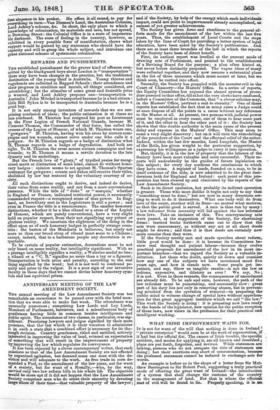REWARDS AND PUNISHMENTS.
THE established punishment for the graver kind of offences com- mitted by the blackguard boys about London is "transportation": there may have been changes in the practice, but the traditional destination of the young thief is Australia. Young thieves and vagabonds are collected in Ragged Schools ; their attendance and their progress in erudition and morals, all things considered, are astonishing ; but the stimulus of some great and desirable prize is wanted, and Lord Ashley proposes one—transportation to Australia John Mitchel is transported because he is a bad citizen : little Bill Sykes is to be transported to Australia because he is a good boy. It is not only among inventors of rewards that we see sur- prising confusion of ideas ; the public estimation is at times no less confused. M. Thierion has resigned his post as Lieutenant in the First Legion of French National Guards, because M. Clement Thomas, the Commander of that force, has called the crosses of the Legion of Honour, of which M. Thierion wears one, "gewgaws!' M. Thierion, having won his cross by sixteen cam- paigns and ten wounds, cannot serve under one who calls it a gewgaw. So M.Thierion regards as a badge of distinction what
Thomas regards as a badge of degradation. And both are right. To M. Thierion the cross means sixteen campaigns and ten wounds; to M. Thomas it means a servile devotion to the late dynasty and its underlings.
But the French love of "glory," of typified praise for recog- nized merit or distinction of some kind, cannot do without hono- rary badges : opinion seems to set against M. Thomas's Spartan contempt for gewgaws ; counts and dukes still receive their titles, abolished by law but restored by the voluntary courtesy of so- ciety. All such distinctions ought to derive, and indeed do derive, their value from some reality, and not from a mere conventional pretence. While the title of " duke" or "marquis," whether in England or France, indicated territorial power, it necessarily commanded respect—a recognized sense of that power. In Eng- land, an hereditary seat in the Legislature is still a power ; and even in France the title is a reminiscence. The smaller honorary distinctions, whether it be a blue riband or a cross of the Legion of Honour, which are purely conventional, have a very slight hold on popular respect, from their not signifying any potent or glorious reality. We ascertain the slightness of the thing in the effect upon us of such honorary badges in perfectly strange coun- tries: the button of the Mandarin is ludicrous, but surely not more so than our broad strap of riband must seem to a Chinese ; except, indeed, that to a barbarous people any decoration is re- spectable. To be certain of popular estimation, decorations must be not only based on some reality, but intelligibly significant. With us a peerage intelligibly signifies a reality, a Waterloo medal no less; a riband or a "C. B." signifies no more than a toy or a figment. Transportation is both prize and penalty, according to the real thing signified by the word ; but it is not well to confound pe- nalty and prize to the vulgar. It is a poor sign of our inventive faculty in these days that we cannot devise better honorary sym- bols and less equivocal prizes.


























 Previous page
Previous page